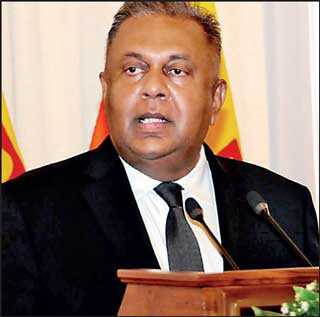Saturday Feb 14, 2026
Saturday Feb 14, 2026
Friday, 6 March 2020 00:00 - - {{hitsCtrl.values.hits}}
By Taylor Dibbert
In his recent opinion piece, Mangala Samaraweera fails to include some pertinent information (‘Mangala has his say on SL’s withdrawal from Resolution 30/1 in UN Human Rights Council’).
 |
Mangala Samaraweera
|
Samaraweera doesn’t mention that key players in the Coalition Government, including the President and Prime Minister, had no intention of implementing the co-sponsored UN Human Rights Council resolution on Sri Lanka that was passed in 2015.
He doesn’t mention that a weak and insecure government never made the case for the resolution or transitional justice to the general public. He doesn’t even mention that these types of reforms are, to put it mildly, quite unpopular with the majority community.
In February 2016, I attended a public event in Washington, D.C. where Samaraweera spoke about the Government’s reconciliation agenda. He gave an upbeat presentation. Sri Lanka was really changing, according to him. Good things were happening, according to him. Reconciliation was possible, according to him.
Samaraweera gave similar talks and presentations elsewhere. He’s an articulate guy and seemed to have good intentions. The problem is that Samaraweera wasn’t ever articulating a vision that lined up with actual Government policy.
He would give these wildly optimistic presentations and provide this soaring rhetoric for international audiences. But then the transitional justice agenda never truly got going.
The Rajapaksa administration is now (and quite unsurprisingly) openly repudiating commitments that the Coalition Government had made vis-à-vis transitional justice.
In his op-ed, Samaraweera talks about how the passage of the co-sponsored resolution “enabled Sri Lanka to regain its due place and dignity on the international stage, normalising its relations with the international community to chart its path to economic progress and prosperity as a hub in the Indian Ocean”. This line of thinking gets to a big part of the problem.
The Coalition Government saw the resolution as a way to placate the international community. This purported agreement was supposed to deflect international pressure that had been building on Sri Lanka. It was meant to show that the Coalition Government was someone that the West could work with. And international actors loved the idea.
Initially, there was this naïve and misguided thinking that the Coalition Government would follow through on a lot of what they promised. Once it became clear that the transitional justice agenda (and much else) was on a road to nowhere, countries like the US still supported the Government.
Washington and others were consistently thinking: Let’s not push this insecure Government very much. The last thing they want is the Rajapaksas back in power. And look how that turned out.